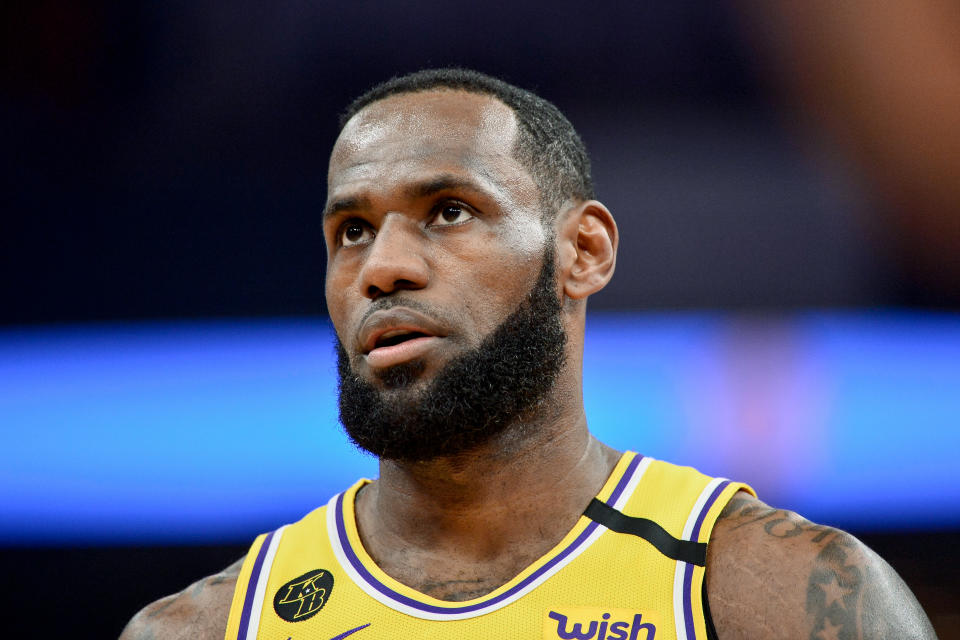With protestors urged to vote, LeBron James asks if 'how we vote is also structurally racist'
There has been a surge in voter registrations while millions march and protest in support of racial justice after George Floyd’s death. Americans are being urged to vote so that their voices are heard, both in local and national elections. A New York Times columnist even called it “The George Floyd Election,” noting that this moment in politics could turn the November election.
But what if the act of voting is itself steeped in racist history and policies?
James asks if voting is ‘structurally racist’
LeBron James posed the question on Twitter on Tuesday and quote-tweeted a thread of Politico national reporter and CNN analyst Laura Barrón-López’s reporting on primary day in Atlanta.
Everyone talking about “how do we fix this?” They say “go out and vote?” What about asking if how we vote is also structurally racist? https://t.co/GFtq12eKKt
— LeBron James (@KingJames) June 9, 2020
He wrote:
“Everyone talking about “how do we fix this?” They say “go out and vote?” What about asking if how we vote is also structurally racist?”
The story is by Barrón-López and Zach Montellaro and details the different experiences voting in the city of Atlanta, a predominately black area, and the suburbs of the city, which is predominately white.
Hours of waiting vs. barely a line

Some voters in Georgia experienced hours of waiting in line to vote on Tuesday and there are issues with the machines, per media reports. One woman the Politico reporters spoke with noticed a large difference though between her polling site and that of the suburbs.
In Atlanta, LaTosha Brown said she waited three hours to vote at her polling site and her nephew waited six hours during Friday’s early voting hours.
She’s the co-founder of Black Votes Matter and went out to a predominately white polling place in the suburbs to find people were walking in and out, without waiting in line, with ease.
“I come over to this side of town, and white folks are strolling in,” said Brown, via Politico. “On my side of town, we brought stadium chairs.”
She told Politico it was important to stop “making voting a traumatic damn experience for black voters.” It’s far from the first time Georgia has experienced such voting issues.
Georgia’s history disenfranchising black voters
The state has a long history of disenfranchising black voters and it was a large concern in the 2018 governor’s race, a historically tight one that brought issues closer to the surface. There were accusations of voter suppression while Republican Brian Kemp, who won the seat, kept his position as secretary of state and therefore in charge of running the election during the campaign.
The midterm election experienced record turnout but hours-long waits at certain voting sites. Election server security breaches and allegations that sites were too strict in following signature matches marred the results. In the year before that election, Kemp’s office purged 500,000 people from the voting rolls in what election-law experts believe could be the largest mass disenfranchisement in U.S. history.
Kemp beat Democrat Stacey Abrams, who has since spearheaded campaigns against voter suppression.
Southern US states close polling places
A 2013 Supreme Court decision weakened the Voting Rights Act of 1965, leading to states shuttering polling places and making it difficult to vote. Areas with a history of voting discrimination had to convince the U.S. Justice Department or a federal court that the election changes they wanted to make would not have a discriminatory impact.
But the Supreme Court struck down that part of the law and as a result states in the south have closed more than 1,200 polling places, Reuters reported in September. It has created longer lines at other polling places amid turnout surges and longer travels for people in certain neighborhoods.
“Moving or closing a polling place, particularly without notice or input from communities, disrupts our democracy. It can mean the choice between picking up a child from school or voting,” Vanita Gupta of Leadership Conference on Civil and Human Rights told a House of Representatives subcommittee, via Reuters.
States have tried to implement strict voter ID laws, though many citizens don’t have a qualified government-issued photo ID. There are restrictions on early voting and hurdles for voter registration.
All of these laws have disproportionately impacted racial minorities.
More from Yahoo Sports:

 Yahoo Finance
Yahoo Finance 
